Mall Tycoon Q&A
We interview Holistic Design and Take-Two about the latest tycoon game.
It's interesting to note that, for as long as "tycoon" games have been around, no one has thought to develop one based on one of the most prominent pillars of our society and economy: malls. That changed last week, when Take-Two Interactive and Holistic Design announced such a game, cleverly called Mall Tycoon. In short, the game lets you create and manage your very own shopping mall, and with more than 250 shops that range in variety from a tattoo parlor to a glitzy boutique, you can make your mall as high-class or as "local" as you want. Naturally, like similar tycoon games, your goal will be to attract as many customers as possible so you'll make as much money as possible. The game sounds intriguing, and it's a little surprising that no one has thought of it before. With that in mind, we sat down with Andrew Greenberg, the game's director at Holistic Design; Robb Alvey, the executive producer at Take-Two; and Tim Beggs, the Take-Two producer, to find out more about Mall Tycoon. Here's what they had to say.
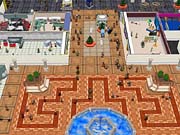
GameSpot: In the past, Holistic Design has developed strategy games based on empire building and conquest. What inspired you to create a management strategy game like Mall Tycoon?
Andrew Greenberg: The idea behind Holistic Design has always been that we can design almost any type of game, be it traditional strategy games, adventure games, role-playing games, miniature games, card games, and more. Take-Two and Holistic wanted to work together, and we all had a strong interest in economic simulation games. On top of that, I worked in retail at a mall throughout my high school and college years. This all combined into what we felt was a natural fit. What better economic sim game is there than one that focuses on what has become the center of our economy?
GS: How far along is the game at this point? How long has it been in development?
Robb Alvey: The game is currently in beta. It has been in development for 12 months, though we had been hammering out the concept well before that.
We began thinking about "tycoon" games nearly two years ago and spent a lot of time brainstorming ideas about what subject matter would make for a fun tycoon game. Mall Tycoon allows the player to have fun creating and managing a world, but it will not be so encompassing that it takes away some of the fun factor.
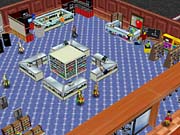
GS: How did the mall setting come up? Were there any other settings you were considering?
Tim Beggs: Naturally, the main things that come to mind when one thinks of tycoon games are building, business, visitors, and fun. We thought about many different settings for a tycoon game, but the mall just seems to lend itself perfectly to the tycoon scheme. When you walk through your local mall, it's everchanging. You see something different every time you visit. We didn't want something that would be static, but something that no matter how long you played, you'd never run out of ideas to change it or make it better. Malls aren't simply retail outlets. Now, more than ever, malls are entertainment centers--where you can just happen to buy stuff too. What we as customers may not realize is that those fun, entertaining aspects all serve the purpose of luring us to the mall to buy things.
GS: What kinds of unique opportunities does the mall environment provide?
AG: When I worked in the mall, I noticed how much all the stores required each other's help to succeed. For instance, the big anchor stores brought in people who would then shop in the little stores, and the number of small stores convinced people to visit the mall anchors instead of their competitors. Additionally, everybody took part in mall-wide promotions, knowing that everyone would benefit from the customers these brought in. We really wanted to build on this sort of interrelationship.
RA: There's also the idea of shoppers versus non-shoppers. Mall walkers, shoplifters, and punks are there to either steal from you or waste space, thereby warding off potential customers. Keep in mind, a successful mall also attracts miscreants and loiterers, although you have the necessary tools to keep everything balanced and profitable.
GS: With all the other "tycoon" games on the market, how will Mall Tycoon stand out?
TB: We put a lot of emphasis on game design and research into Mall Tycoon so it wouldn't seem static or stale. We wanted as many gameplay options as possible, and we wanted the game to be easy for people who wanted to jump right in and "build something," while at the same time being intricate for the player who wants to be an "interior decorator," choosing wall patterns, floor tiles, commodities, and so on, for each individual store. It's features like these that should make our game stand out.
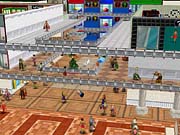
Mall Tycoon has a great building aspect to it, which is something we believe makes great tycoon games stand out. It's like playing with Lego. There's a lot for the player to discover and get lost in just playing around with the building aspect.
There's also great familiarity with the subject matter. For teenagers, the mall is a major hangout. You can buy your clothes, video games, and pretty much anything else there. You might take a date to the movies or to dinner there. Moms and dads have to shuttle their kids off to see Santa Claus. We all know the atmosphere, the sights, and the sounds. It was important for us to capture that atmosphere in the game--all wrapped up in a great 3D engine.
GS: How do you judge a mall's success in the game? What kinds of things can you do to make your mall more successful?
AG: The most obvious way is its financial success. The mall makes money from the stores' incomes in rents. The better they do, the better the mall as a whole does. This requires a good mix of stores, as well as a lot of promotions, to attract as many shoppers from various demographics as possible. However, the most successful malls are also the most aesthetically pleasing. In real life, people like to visit the more attractive mall, and we have replicated this in the game. Stores have an attractiveness rating based on their decor, as well as how new and well maintained they are.
RA: One of the big things you want to do is build an atrium. This is like the heart of your mall, where you conduct all the special promotions. You'll also want to place things like ATMs so shoppers can get more money to spend in your mall. Of course, shoppers want to feel safe while they spend their hard-earned cash, so security plays a role as well. There's a number of strategies you can employ to attract shoppers and keep them shopping.
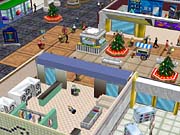
GS: Can you describe some of the special events and attractions you can add to your mall and explain how they will tie in to the game?
AG: We've added many of the special promotions malls like to host (bands, car shows, spring sales, and so on), and players can use these to attract certain types of shoppers to their malls. Using these well can make or break a mall.
GS: You've said that Mall Tycoon will include more than 250 types of stores. Can you describe some of the more interesting kinds of stores?
AG: The variety comes in the many types of goods and services you can combine in one store. I tend to like the toy, book, computer game, and pizza store, though others prefer the lingerie and leather goods store. How these get combined is completely up to the player.
TB: This is where mixing and matching and finding the best combination of products comes in. And depending on what variety of items you place in the larger stores, for example, if you put pet supplies and Chinese food together, you might end up confusing the shoppers, keeping them from coming in your store until you come up with a more common mix of products.
GS: The game announcement mentioned that players will have to watch out for shoplifters, mall punks, and supernatural creatures. What kind of supernatural creatures visit malls?
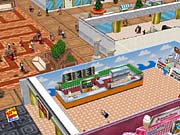
AG: You've never worked at a mall late at night, have you? If malls aren't natural environments for the walking dead, I don't know what are.
RA: One of our goals was to throw in a smattering of tongue-in-cheek elements to capture some oddball moments that came out of Hollywood.
GS: Does the game include different kinds of shoppers? Are there ways to cater specifically to different shopper types?
AG: This is a major facet of the game. Every time a player starts a new game, it creates a new array of consumers in the nearby area, and these are the ones the players hope to attract. Their age, wealth, crowd tolerance, and more all come into play. Different stores, ad campaigns, promotions, and the like appeal to different groups. Players can focus on specific demographics or try to make more universally appealing malls.
TB: The types of commodities in each store will attract different shoppers. You might find more males in the arcade or electronics store, and more females looking for home appliances. A store with housewares, appliances, and furniture might attract a wide variety of shoppers.
GS: In addition to Mall Tycoon's free-building mode, the game will include different scenarios. Can you describe some of the different scenarios players might encounter?
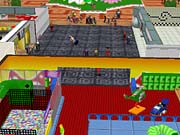
AG: Some malls seem to be havens for criminals, while others are in worse condition than a game developer's office during beta. Others begin in debt, and others have owners who want you to turn it into the biggest, best thing around. All these are challenges for the mall managers.
GS: When can we expect to see the game in stores?
RA: The expected ship date is January 2002.
GS: Is there anything else you'd like to add?
AG: I believe that there is a good reason for the explosion of tycoon games. Not only do they offer the chance to take on roles most of us find interesting, but they are also an excellent form of strategy game. You do your best when you begin with a plan in mind of how to succeed, and you then build to fit this goal. You might not get to fight orcs and demons, but you still have to build an empire that will stand the test of time.
TB: Whether or not someone thinks they are creative, tycoon games tap into that natural creativity in all of us. The whole idea of building your own little world and nurturing it to become bigger and better is extremely appealing.
GS: Gentlemen, thanks for your time.
Got a news tip or want to contact us directly? Email news@gamespot.com
Join the conversation